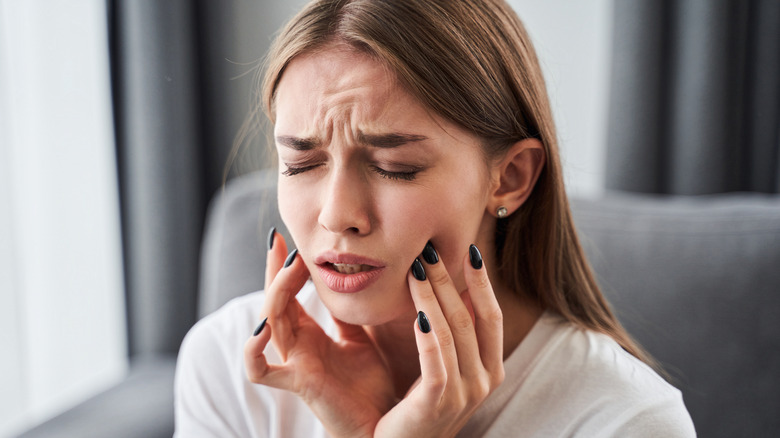What You Should Eat After Getting Your Wisdom Teeth Removed
Wisdom teeth are the last permanent teeth to grow into the mouth, usually appearing in late adolescence or early adulthood (via Mayo Clinic). For some people, wisdom teeth never grow in, while others develop them with no issues. However, many people have wisdom teeth that are impacted, meaning they don't have enough room to grow and develop normally. In turn, this can cause pain, tenderness, and infection. For these cases, the wisdom teeth may have to be surgically removed. Some dentists may recommend removing wisdom teeth in order to prevent future issues, even if the teeth aren't causing troubles now.
Wisdom tooth extraction is a surgical procedure that doesn't come without risk. The biggest side effect is pain and swelling of the gums and area where the tooth was removed. After the procedure, you'll want to stick to liquids and soft foods to help manage the pain (via Healthline). Foods you may want to try include applesauce, yogurt, mashed potatoes, smoothies, blended soups or broths, pudding, ice cream, and Jell-O. Colder foods may help relieve some pain. Nutrient-rich foods, such as soups and smoothies, will help balance out sugary foods and promote healing.
What not to eat after wisdom teeth removal
Solid foods should be avoided — especially things like seeds, grains, and rice — as they can cause pain or get trapped in the extraction site. You should also avoid spicy and acidic foods like citrus fruits and juices, which can cause irritation. Foods that are difficult to chew such as jerky, nuts, and chips can reopen stitches, so it's best not to eat those items during the healing process. Alcoholic drinks can irritate the extraction site and should not be taken with the pain medications often prescribed following wisdom tooth removal. Finally, while smoothies and other liquids are a good choice, avoid using a straw, as the sucking motion could dislodge the healing blood clot forming in the wound (via Medical News Today).
Follow your dentist or oral surgeon's advice for caring for your mouth after the extraction. This may include biting down on gauze for a half hour after the procedure, and applying ice to your face to reduce swelling. You will also need to keep the wound clean by rinsing with antiseptic wash. If you can, try to take a day or two off work after the surgery to rest and recover.


